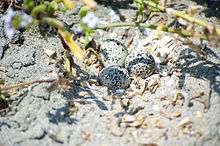Snowy plover
| Snowy plover | |
|---|---|
 | |
| Snowy plover near Cayucos, California | |
| Scientific classification | |
| Kingdom: | Animalia |
| Phylum: | Chordata |
| Class: | Aves |
| Order: | Charadriiformes |
| Family: | Charadriidae |
| Genus: | Charadrius |
| Species: | C. nivosus |
| Binomial name | |
| Charadrius nivosus Cassin, 1858 | |
The snowy plover (Charadrius nivosus) is a small wader in the plover bird family. It breeds in Ecuador, Peru, Chile, the southern and western United States and the Caribbean. Long considered to be a subspecies of the Kentish plover, it is now known to be a distinct species.
Taxonomy
Genetic research published in 2009 strongly suggested that the snowy plover is a separate species from the Kentish plover,[2] and by July, 2011, the International Ornithological Congress (IOC), and the American Ornithologists' Union (AOU) North American committee have recognized them as separate species. Other taxonomic committees are reviewing the relationship.
Physically, snowy plovers are shorter-legged, paler and greyer above than its Old World sister species, and breeding males lack a rufous cap. The eye mask is also poorly developed or absent.
Reproduction

The snowy plover breeds on sandy coasts and brackish inland lakes, and is uncommon on fresh water. It nests in a ground scrape and lays three to five eggs.
The breeding birds in warmer countries are largely sedentary, but northern and inland populations are migratory, wintering south to the tropics. Food is insects and other invertebrates, which are obtained by a run-and-pause technique, rather than the steady probing of some other wader groups.
The snowy plover breeds from Texas and Oklahoma west to California and up the coastline to Oregon and Washington, with the coastal form's primary breeding concentration in central and southern California.[3] On March 5, 1993 the western snowy plover was listed as a threatened species under the Endangered Species Act of 1973. As of June 19, 2012, the habitat along the California, Oregon, and Washington Coasts have been listed as critical.[4]
In many parts of the world, it has become difficult for this species to breed on beaches because of disturbance from the activities of humans or their animals. The University of California, Santa Barbara (UCSB) is currently endeavoring to rehabilitate snowy plover populations by protecting beaches along the central California coastline that runs along part of the university campus.[5] UCSB has had some success in encouraging reproduction; the university also often trains students and other volunteers to watch over protected beaches during the daytime to ensure no one disturbs nesting grounds.
References
- ↑ BirdLife International (2012). "Charadrius nivosus". IUCN Red List of Threatened Species. Version 2015.2. International Union for Conservation of Nature. Retrieved 12 August 2015.
- ↑ Küpper, Clemens; Augustin, Jakob; Kosztolányi, András; Burke, Terry; Figuerola, Jordy; Székely, Tamás (2009). "Kentish versus Snowy Plover: phenotypic and genetic analyses of Charadrius alexandrinus reveal divergence of Eurasian and American subspecies" (PDF). The Auk. The American Ornithologists’ Union. 126 (4): 839–852.
- ↑ "Recovery Plan for the Pacific Coast Population of the Western Snowy Plover (Charadrius nivosus nivosus)" (PDF). U.S. Fish and Wildlife Service. Retrieved 12 February 2016.
- ↑ "Western Snowy Plover Species Profile". www.fws.gov. U.S. Fish and Wildlife Service. Retrieved 8 February 2016.
- ↑ "2003 UCSB Press Release on snowy plovers". World Heritage. Retrieved 21 May 2007.
Bibliography
- Gill, F.; Donsker, D., eds. (2011). "IOC World Bird List (v 2.9)". Retrieved 31 July 2011.
- Chesser, R. Terry; Banks, Richard C.; Barker, F. Keith; Cicero, Carla; Dunn, Jon L.; Kratter, Andrew W.; Lovette, Irby J.; Rasmussen, Pamela C.; Remsen, J. V.; Rising, James D.; Stotz, Douglas F.; Winker, Kevin (2011). "Fifty-second supplement to the American Ornithologists' Union Check-List of North American Birds". Auk. 128 (3): 600–613.
External links
| Wikimedia Commons has media related to Charadrius nivosus. |
| Wikispecies has information related to: Charadrius nivosus |
- Western Snowy Plover - Tools and Resources for Recovery
- "Charadrius nivosus". Integrated Taxonomic Information System.
- BirdLife species factsheet for Charadrius nivosus
- "Charadrius nivosus". Avibase.

- Snowy plover photo gallery at VIREO (Drexel University)
- Interactive range map of Charadrius nivosus at IUCN Red List maps
- Audio recordings of Snowy plover on Xeno-canto.
- Charadrius nivosus in the Flickr: Field Guide Birds of the World
- Snowy plover media at ARKive

